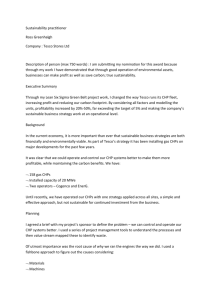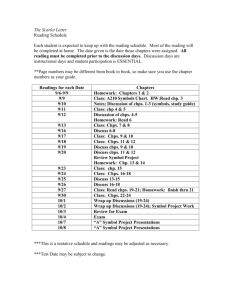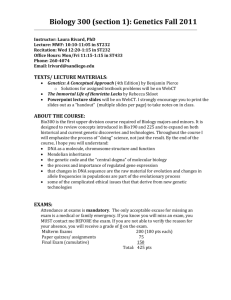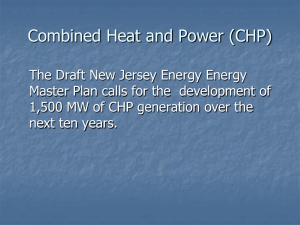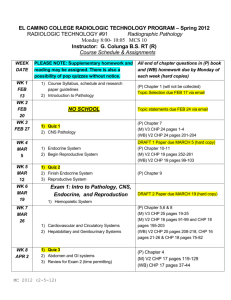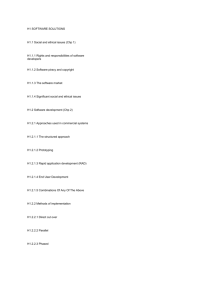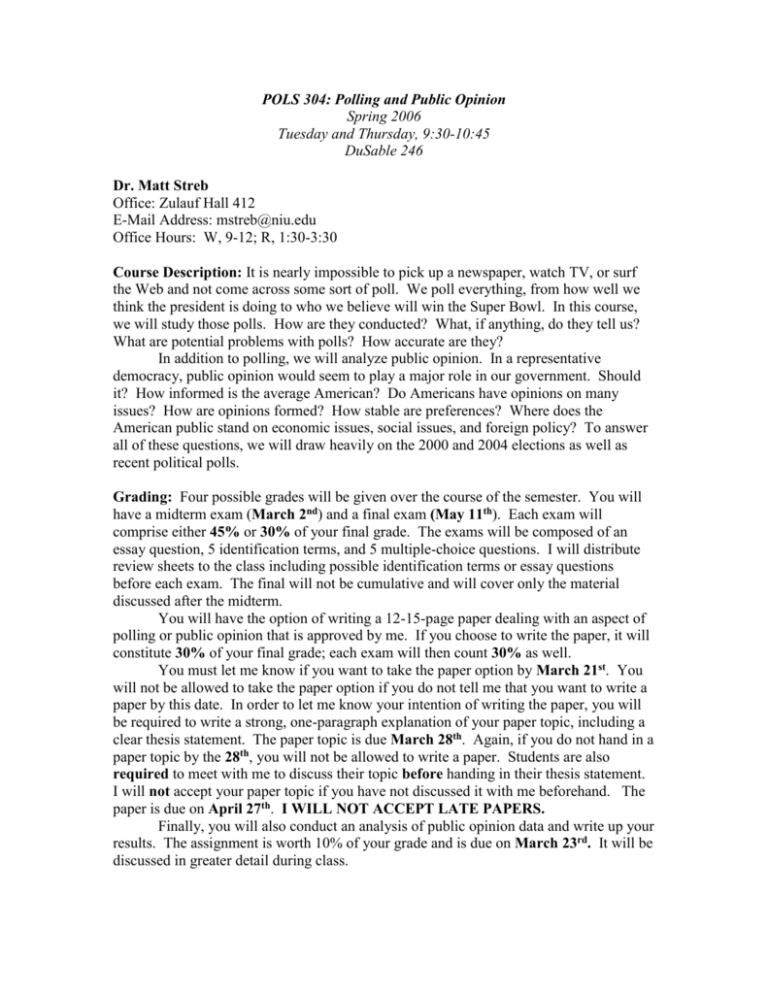
POLS 304: Polling and Public Opinion
Spring 2006
Tuesday and Thursday, 9:30-10:45
DuSable 246
Dr. Matt Streb
Office: Zulauf Hall 412
E-Mail Address: mstreb@niu.edu
Office Hours: W, 9-12; R, 1:30-3:30
Course Description: It is nearly impossible to pick up a newspaper, watch TV, or surf
the Web and not come across some sort of poll. We poll everything, from how well we
think the president is doing to who we believe will win the Super Bowl. In this course,
we will study those polls. How are they conducted? What, if anything, do they tell us?
What are potential problems with polls? How accurate are they?
In addition to polling, we will analyze public opinion. In a representative
democracy, public opinion would seem to play a major role in our government. Should
it? How informed is the average American? Do Americans have opinions on many
issues? How are opinions formed? How stable are preferences? Where does the
American public stand on economic issues, social issues, and foreign policy? To answer
all of these questions, we will draw heavily on the 2000 and 2004 elections as well as
recent political polls.
Grading: Four possible grades will be given over the course of the semester. You will
have a midterm exam (March 2nd) and a final exam (May 11th). Each exam will
comprise either 45% or 30% of your final grade. The exams will be composed of an
essay question, 5 identification terms, and 5 multiple-choice questions. I will distribute
review sheets to the class including possible identification terms or essay questions
before each exam. The final will not be cumulative and will cover only the material
discussed after the midterm.
You will have the option of writing a 12-15-page paper dealing with an aspect of
polling or public opinion that is approved by me. If you choose to write the paper, it will
constitute 30% of your final grade; each exam will then count 30% as well.
You must let me know if you want to take the paper option by March 21st. You
will not be allowed to take the paper option if you do not tell me that you want to write a
paper by this date. In order to let me know your intention of writing the paper, you will
be required to write a strong, one-paragraph explanation of your paper topic, including a
clear thesis statement. The paper topic is due March 28th. Again, if you do not hand in a
paper topic by the 28th, you will not be allowed to write a paper. Students are also
required to meet with me to discuss their topic before handing in their thesis statement.
I will not accept your paper topic if you have not discussed it with me beforehand. The
paper is due on April 27th. I WILL NOT ACCEPT LATE PAPERS.
Finally, you will also conduct an analysis of public opinion data and write up your
results. The assignment is worth 10% of your grade and is due on March 23rd. It will be
discussed in greater detail during class.
Grading Scale:
93%-100%
A
83%-87.4% B
73%-77.4% C
Less than 60% F
90%-92.9%
80%-82.9%
70%-72.9%
ABC-
87.5%-89.9% B+
77.5%-79.9% C+
60%-69.9% D
In rare instances, I will raise a final grade slightly if the student regularly attends class,
participates, and shows progress. I will only consider raising a student’s grade if s/he
writes a paper.
Required Course Materials:
Three books are required for this course:
-Asher, Herbert. 2004. Polling and the Public: What Every Citizen Should
Know, 6th ed. Washington, DC: CQ Press.
-Erikson, Robert S., and Kent Tedin. 2005. American Public Opinion, 7th ed.
New York: Pearson Longman.
-Genovese, Michael A., and Matthew J. Streb (eds.). 2004. Polls and Politics:
The Dilemmas of Democracy. Albany, NY: SUNY Press.
These books are available at the NIU Bookstore. Students are strongly encouraged to
visit sites such as www.campusi.com to find cheaper, used versions of these books
(although, students should not buy earlier editions of the Asher or Erikson and Tedin
books since they have been updated substantially).
Polling and Public Opinion Websites:
AAPOR
www.aapor.org/
CNN
www.cnn.com
Gallup
www.gallup.com
Harris
www.harrisinteractive.com
Los Angeles Times
www.latimes.com/news/custom/timespoll/
MSNBC
www.msnbc.com
Pollingreport.com
www.pollingreport.com
Reuters
www.reuters.com
Washington Post
www.washingtonpost.com/wpdyn/content/politics/polls/
Zogby
www.zogby.com
Course Policies:
1. Attendance: I do not require class attendance. However, if you want to have any
hope of passing the class or doing well, you will need to be here. I have yet to see a
person who has regularly missed my class pass the course.
2. Be on time: Class begins promptly at 9:30. Please be in your seats and ready to go at
9:30. If you must be late, please enter the class quietly and quickly and sit in the back.
3. Turn the cell phones off!: My policy is that if your cell phone goes off in class, I’m
the one who answers it. Unless you want me talking to your parents, siblings, or
boyfriend/girlfriend, turn the cell phones off.
4. Makeup Exams: I will only give a makeup examination under extraordinary
circumstances. If such circumstances arise, please contact me as soon as possible and
before the scheduled exam. If you fail to contact me before the scheduled exam, you will
receive a 0 for the exam. Students may be asked to support requests for makeup exams
with documentation.
5. Late Assignments: I do not accept late assignments. If you fail to hand in your paper
or public opinion assignment on time, you will receive a 0 for the assignment. If an
extraordinary situation arises that will keep you from handing in your paper or
assignment on time, please contact me as soon as possible and before the scheduled
assignment is due. Being out of town does not constitute an “extraordinary situation.”
6. Academic Dishonesty: In preparing for your work and meeting the requirements of
this course, you are expected to adhere to all the rules, regulations, and standards set forth
by the Department of Political Science, Northern Illinois University, and the scholarly
community. This statement encompasses intentional and unintentional plagiarism;
cheating on examinations; using, purchasing, or stealing others’ work; misusing library
materials; and so forth. Failure to honor these rules, regulations, and standards could
result in a failing course grade and/or suspension or expulsion from the university. Don’t
plagiarize or cheat. I will catch you!
7. Students with Disabilities: Under Section 504 of the Rehabilitation Act of 1973, NIU
is committed to making reasonable accommodations for persons with documented
disabilities. Those students with disabilities that may have some impact on their
coursework and for which they may require accommodations should notify the Center for
Access-Ability Resources (CARR) on the fourth floor of the Health Services Building.
CAAR will assist students in making appropriate accommodations with course
instructors. It is important that CARR and instructors be informed of any disabilityrelated needs during the first two weeks of the semester.
How can I do well in this course?
This course may be somewhat different than other classes you have had in the
past. It is essential that you are regularly in class, take good notes, do all of the readings,
and spend some time reflecting on what you have read. Because there is a significant
amount of reading in the course, make sure you keep up with it. Doing all of the assigned
reading the night before the class will keep you from contributing much to the class.
More importantly, it will keep you from getting the most out of the course. If you do not
do the readings, you will not do well in this class.
Each class you will be introduced to “key terms.” I highly recommend that you
make notecards after class that include the definition and significance of the term. These
are the terms that will appear on your tests. Making notecards after each class may seem
like more work, but it will actually cut your work time in the end and allow you to write
much stronger IDs. Instead of preparing for the IDs (they start to add up) before the
exam, you will already have the IDs ready to go and can begin studying earlier. Writing
out the IDs after class will allow you to write higher quality IDs because the information
will be fresh in your mind, and if you don’t understand something it will become
apparent quickly.
Finally, I strongly encourage students to visit me during my office hours if you
have questions about the course material.
Department of Political Science Web Site:
Undergraduates are strongly encouraged to consult the Department of Political
Science web site on a regular basis. This up-to-date, central source of information will
assist students in contacting faculty and staff, reviewing course requirements and syllabi,
exploring graduate study, researching career options, tracking department events, and
accessing important details related to undergraduate programs and activities. To reach the
site, go to http://polisci.niu.edu.
Course Outline:
NOTE: Readings should be completed for the day in which they are assigned (ex:
Students should read Asher, chp 1; Erikson and Tedin, chp 1; and Genovese and Streb,
chp 1 by class on 1/19).
NOTE: * indicates reading is available on electronic reserve
Polling
1/17
T
Introduction to the Course
1/19
R
What Is Public Opinion and the History of Polling
Reading: Asher, chp 1; Erikson and Tedin, chp 1; Genovese and
Streb, chp 1
1/24
T
Constructing the Survey
Reading: A, chps 2-3; E&T, chp 2
1/26
R
Constructing the Survey, cont.
1/31
T
Choosing the Right Survey
Reading: A, chp 5
2/2
R
Implementing the Survey
Reading: A, chps 4
2/7
T
Tour of the Public Opinion Lab (Meet at the POL on 3rd Street)
2/9
R
Types of Polls
Reading: A, chps 6-7; G&S, chps 6-8
2/14
T
Types of Polls, cont.
2/16
R
Estimating Turnout and Allocating the Undecideds
2/21
T
Analyzing Polls
Reading: A, chps 8-9; G&S, chp 5
2/23
R
How Do Politicians Use Polls?
Reading: G&S, chps 3-4
2/28
T
Midterm Review
3/2
R
MIDTERM (please bring a blank disk to class with you)
Public Opinion and Political Socialization
3/7
T
Analyzing Public Opinion Data
3/9
R
Analyzing Public Opinion Data, cont.
3/14 and 3/16
No Class. Have a great Spring Break!
3/21
T
Are We Model Citizens?
Reading: Robinson*
Deadline to let me know if you are writing the paper
3/23
R
Political Socialization and Opinion Formation
Reading: E&T, chp 5
Public Opinion Analysis Due
3/28
T
Who Are the “Don’t Knows?”
Reading: E&T, chp 3
Paper topic due
3/30
R
Macro Public Opinion
Reading: E&T, chp 4
4/4
T
Public Opinion on Issues of Race and Ethnicity
Reading: E&T, chp 6
4/6
R
Public Opinion on Social Welfare and Economic Issues
Reading: Brewer*
4/11
T
Is There a Culture War in the United States?
Reading: Brooks*
4/13
R
Movie: Constructing Public Opinion
4/18
T
Public Opinion on Foreign Policy
Reading: Bardes and Oldendick*
4/20
R
No class. MPSA Conference.
4/25
T
Group Differences in Public Opinion
Reading: E&T, chp 7
4/27
R
The Media and Public Opinion
Reading: E&T, chps 8-9
Paper Due!
5/2
T
Public Opinion and Representation
Reading: E&T, chps 10-11, G&S chp 2 and 9
5/4
R
Final Exam Review
5/11
R
Final Exam (10:00AM-11:50AM)
Public Opinion Data (Note: You must save the data—by right clicking—and then
open from within SPSS).


